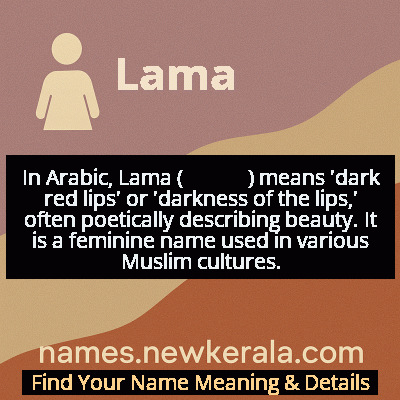Lama Name Meaning & Details
Origin, Popularity, Numerology Analysis & Name Meaning of Lama
Discover the origin, meaning, and cultural significance of the name LAMA. Delve into its historical roots and explore the lasting impact it has had on communities and traditions.
Name
Lama
Gender
Female
Origin
Muslim
Lucky Number
9
Meaning of the Name - Lama
In Arabic, Lama (لَمَى) means 'dark red lips' or 'darkness of the lips,' often poetically describing beauty. It is a feminine name used in various Muslim cultures.
Lama - Complete Numerology Analysis
Your Numerology Number
Based on Pythagorean Numerology System
Ruling Planet
Mars
Positive Nature
Generous, passionate, energetic, and humanitarian.
Negative Traits
Impulsive, impatient, moody, and can be overly emotional.
Lucky Colours
Red, maroon, scarlet.
Lucky Days
Tuesday.
Lucky Stones
Red coral, garnet.
Harmony Numbers
1, 2, 3, 6.
Best Suited Professions
Military, sports, philanthropy, leadership roles.
What People Like About You
Courage, energy, leadership, generosity.
Famous People Named Lama
Lama Al-Ghamdi
Saudi Businesswoman
Founder of multiple successful fashion and lifestyle brands in the Middle East
Lama Khater
Palestinian Journalist
Award-winning journalist known for her coverage of Middle Eastern affairs and women's rights
Lama Abu-Odeh
Academic and Legal Scholar
Professor at Georgetown University specializing in Islamic law and gender studies
Lama Al-Arian
Television Host
Popular TV presenter on major Arabic networks known for cultural programming
Name Variations & International Equivalents
Click on blue names to explore their detailed meanings. Gray names with will be available soon.
Cultural & Historical Significance
Extended Personality Analysis
Individuals named Lama typically exhibit a distinctive personality profile that blends traditional grace with modern sophistication. They often possess exceptional communication abilities, demonstrating both listening skills and articulate expression that aligns with the name's association with lips and speech. Many Lamas show natural diplomatic tendencies, able to mediate conflicts and build consensus in diverse groups. Their emotional intelligence tends to be highly developed, allowing them to read social cues and respond with appropriate empathy. Common traits include artistic appreciation, often manifesting in interests ranging from literature and poetry to visual arts and design. Lamas typically demonstrate quiet confidence rather than overt assertiveness, influencing others through persuasion and example rather than command. They often show remarkable adaptability, balancing respect for tradition with openness to innovation. In professional settings, they excel in roles requiring communication, creativity, and interpersonal skills. Their strength often lies in resilience and inner determination, facing challenges with composed grace. Many develop strong intuitive abilities, making them excellent judges of character and situations. The name suggests someone who values authenticity and depth in relationships, often forming lasting bonds based on mutual understanding and respect.
Modern Usage & Popularity
In contemporary naming practices, Lama maintains a distinctive position as a traditional yet modern choice for Muslim families worldwide. The name experiences consistent, moderate popularity across Arabic-speaking countries, particularly in Saudi Arabia, Jordan, Lebanon, and the United Arab Emirates. While not ranking among the top 10 most popular names, it enjoys steady usage among families seeking names with cultural depth and beautiful meanings. The digital age has influenced the name's perception, with several prominent social media influencers, professionals, and artists named Lama increasing its visibility and appeal. Among diaspora communities in Europe and North America, Lama serves as an ideal bridge name—easily pronounceable across cultures while maintaining strong Islamic identity. Recent trends show increased adoption by younger, urban parents who appreciate its poetic quality and cultural heritage. The name's usage patterns indicate preference among educated, middle-class families valuing both tradition and modernity. Interestingly, the name has also gained some crossover appeal among non-Muslim parents attracted to its melodic sound and elegant meaning, though it remains predominantly used within Muslim communities. Search data and birth registries show consistent interest, with slight increases during periods of cultural nostalgia or renewed interest in traditional names.
Symbolic & Spiritual Meanings
The symbolic meanings of Lama extend far beyond its literal translation, encompassing layers of cultural, spiritual, and metaphorical significance. Symbolically, the 'darkness of lips' represents authenticity, natural beauty, and the power of truthful expression. In many interpretations, it signifies wisdom that comes with experience—the lips darkening with age and use, much like how repeated prayer darkens prayer beads. The name carries connotations of sacred speech, connecting to Islamic traditions where the mouth serves as the instrument for Quranic recitation and daily prayers. Metaphorically, Lama represents the bridge between inner thought and outer expression, suggesting someone who speaks with intention and purpose. The darkness symbolizes depth, mystery, and hidden knowledge—qualities valued in many spiritual traditions. It also represents cultural continuity, serving as a living connection to ancient Arabian aesthetic values in a modern context. The name symbolizes the beauty of natural states, contrasting with artificial enhancements and representing authenticity in an increasingly manufactured world. In psychological terms, it can represent the integration of shadow and light—acknowledging that true beauty and wisdom often emerge from embracing all aspects of experience. The symbolic richness makes Lama not just a name but a narrative about cultural identity, personal authenticity, and the enduring power of meaningful communication.

